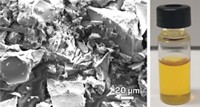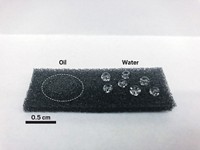Advertisement
Grab your lab coat. Let's get started
Welcome!
Welcome!
Create an account below to get 6 C&EN articles per month, receive newsletters and more - all free.
It seems this is your first time logging in online. Please enter the following information to continue.
As an ACS member you automatically get access to this site. All we need is few more details to create your reading experience.
Not you? Sign in with a different account.
Not you? Sign in with a different account.
ERROR 1
ERROR 1
ERROR 2
ERROR 2
ERROR 2
ERROR 2
ERROR 2
Password and Confirm password must match.
If you have an ACS member number, please enter it here so we can link this account to your membership. (optional)
ERROR 2
ACS values your privacy. By submitting your information, you are gaining access to C&EN and subscribing to our weekly newsletter. We use the information you provide to make your reading experience better, and we will never sell your data to third party members.
Environment
Cigarette Butts Yield A Chemical Rebuttal
Recycling: Extracting anticorrosion compounds from spent cigarettes could benefit the environment and steel
by Stephen K. Ritter
April 12, 2010
| A version of this story appeared in
Volume 88, Issue 16

Chinese researchers think there's great potential to do something useful with cigarette butts: Extract the chemicals trapped in the filter and in residual tobacco, and then use the resulting brew as an anticorrosion treatment for steel and other metal-based materials.
Cigarette butts are one of the most ubiquitous forms of pollution on the planet, with an estimated 4.5 trillion butts flicked out of car windows, tossed aside on sidewalks, or otherwise discarded each year. The environmental impact of cigarette butts goes beyond being an eyesore because chemicals leaching from residual tobacco are toxic to fish.
Jun Zhao of Xi'an Jiaotong University and coworkers extracted cigarette butts they picked up from the street or out of the garbage with water for 24 hours and used infrared spectroscopy and mass spectrometry to identify nine compounds in the solution. These included nicotine, as well as anthraquinone and β-carotene derivatives (Ind. Eng. Chem. Res., DOI: 10.1021/ie100168s).
The researchers acidified the extract and used it to treat steel disks, achieving up to 95% efficiency in preventing metal corrosion compared with untreated steel. They believe the chemical adsorb and form a protective layer on the metal surface. In addition, the leftover cellulose acetate from the filters is amenable to recycling to make other materials.
Zhao says her team is pursuing a patent on the process and would like to develop it on a large scale. But she believes ridding the world of cigarette butts will need the help of governments to provide incentives for systematically collecting them.
The paper on cigarette butts caught the attention of I&ECR Editor Donald R. Paul, a chemical engineer at the University of Texas, Austin. "There has been much research on developing corrosion inhibitors to combat the costly corrosion of metals," Paul says. "A few surprising reports and patents suggest tobacco products have some anticorrosion benefits. This paper adds further evidence for and details about potential corrosion inhibition by tobacco and suggests an interesting use for discarded cigarette butts."






Join the conversation
Contact the reporter
Submit a Letter to the Editor for publication
Engage with us on Twitter